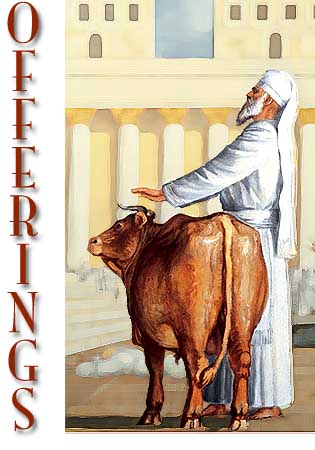 Review & Intro: We have looked at 5 offerings in the last 5 chapters of Leviticus: The Burnt Offering, The Grain Offering, The Peace Offering, The Sin Offering, and The Guilt Offering. Beginning with Leviticus 6:8, these will be reviewed again, but the focus will be on the duty of the priests: what their obligations are in relation to each of these offerings and sacrifices. Just as we learned important spiritual principles from the commands that were given to the worshippers of Israel who were to bring the offerings and from the symbolism of the offerings themselves, so also there are important things to learn from God’s commands to those who are to mediate these offerings, those who were to be the priests representing God’s people and offering up these sacrifices to the Lord.
Review & Intro: We have looked at 5 offerings in the last 5 chapters of Leviticus: The Burnt Offering, The Grain Offering, The Peace Offering, The Sin Offering, and The Guilt Offering. Beginning with Leviticus 6:8, these will be reviewed again, but the focus will be on the duty of the priests: what their obligations are in relation to each of these offerings and sacrifices. Just as we learned important spiritual principles from the commands that were given to the worshippers of Israel who were to bring the offerings and from the symbolism of the offerings themselves, so also there are important things to learn from God’s commands to those who are to mediate these offerings, those who were to be the priests representing God’s people and offering up these sacrifices to the Lord. Leviticus 6:8 - Leviticus 7 - Offerings of Priests
Note: When the Lord told Moses the instructions to give Aaron and his sons for the priesthood concerning the laws of the offerings, He said to "command" them. These were to be followed precisely.(vs.1)
1. The first "law" recorded is for: The Burnt Offering ..... How long was the offering to remain on the hearth on the altar? vs. 9
2. What is required of the fire on the altar? vs. 9
3. Changing of Garments. What was the priest to wear when he took the ashes from the altar to place them beside the altar? vs. 10
4. What was the priest "to do" before he carried the ashes outside the camp to a clean place? vs. 11
5. Fire on the Altar. What is repeated in regard to the fire on the altar? vs. 12
6. What was the priest to do concerning the fire of the altar every morning? vs. 12 - Name 3 things
7. What is repeated again in verse 13?
8. The next "law" recorded is for: The Grain Offering. ..... Where were the sons of Aaron to present it ? vs. 14
9. One of the priests were to ... lift up from it... a handful of fine four of the grain offering. What 2 things were included with this? vs. 15
10. When the priest offered it up in the smoke on the altar, what 2 things was it for the Lord? vs. 15
11. Aaron and his sons could eat what was left of it, but it was to be baked into "unleavened" cakes eaten in a holy place in the court of the tent of meeting. (vs.16) ... Who did the offering belong to and Who was the one to give it to Aaron and his sons to eat? vs.17
12. The Lord said that the Grain Offering was Most Holy. What other offerings did He compare it to? vs. 17 - Name 2
13. Every male among the sons of Aaron were to eat it as a permanent ordiance throughout their generations. To touch them would be to be consecrated. (vs.18) ...
14. Next, there was an offering some have called ... The Ordination Offering ... because it was to be done "on the day" that one of Aaron's sons would become the designated High Priest (or anointed priest) to replace the one before him. (vs.19-23). ... What was the grain offering measurement the priest was to do for the day he was anointed? How much was he to have morning and evening? vs. 20
15. How was he to prepare the grain offering for his ordination as the anointed priest? vs. 21
16. When he presented it before the Lord what would it be to the Lord? vs. 21
17. Of this grain offering, it was to be burned entirely and none of it eaten. How long was this to be an ordinance for Aaron and his sons who would become the anointed priest? vs.22-23-
18. The next "law" record is for: The Sin Offering ..... It was to be slain in the same place that the burnt offering was slain. (vs.25) .. Who would be able to eat it in a holy place in the court of the tent of meeting? vs. 26
19. Anyone who would touch the flesh of the sin offering would become consecrated. What would be required of a garment if blood were to splash on it from the sacrifice of the sin offering? vs. 27
20. When the priest boiled the flesh of the meat to eat it, what would he do with the earthenware vessel that was used? vs. 28
21. What would he do if he had boiled the flesh in a bronze vessel? vs. 28
22. Who was allowed to eat of the sin offering? vs. 29
23. If the sin offering had been made for atonement and had some of the blood brought into the tent of meeting, it was not to be eaten. What was to be done of it? vs. 30
Leviticus Chapter 7 - More Offerings ....
24. The next "law" recorded is for: The Guilt Offering .....Where were they to slay the Guilt offering? vs. 2
25. Where was the blood to be sprinkled from it? vs. 2
26. All the fat was to be offered up in smoke on the altar as an offering by fire to the Lord as a guilt offering. (vs.3-5). Who was allowed to eat of it in a holy place? vs. 6
27. Like the sin offering, the priest who makes atonement for another was the one to eat from the guilt offering. He was also able to have the skin from the burnt offering that he made atonement for. (vs.7-8) Likewise, every grain offering baked in the oven, prepared in a pan, or on a griddle belonged to the priest that presented it before the Lord. (vs.9). ... Who would every grain offering mixed with oil or dry belong to? vs. 10
28. The next "law" recorded is for: The Peace Offering ..... If it was offered by way of thanksgiving, then he would also offer "unleavened" cakes mixed with oil and "unleavened" wafers spread with oil as well as cakes of well stirred fine flour mixed with oil. (vs.12)... What else was he to offer with the sacrifice of his peace offerings? vs. 13
29. Why do you think it was "leavened" and not "unleavened"? Interesting to think about. Share your thoughts.
30. Of this, he was to present "one" of every offering as a contribution to the Lord. Who did it belong to? vs. 14
31. When was the flesh of the thanksgiving peace offering to be eaten? vs. 15 ..... What other instructions were given concerning it? vs. 15
32. If the sacrifice of his offering was a votive or freewill offering, what 2 days was he allowed to eat it on? vs.16 -
33. What was to be done with any leftovers on the third day? vs. 17
34. What would the consequences be if anyone ate any of the flesh of the peace offering on the third day? vs. 18
35. If the flesh touched anything unclean, it was not to be eaten, but burned with fire. As for the other flesh, anyone who was clean could eat such flesh. (vs.19) Those who at flesh while being unclean would be cut off from the people. (vs.20)...What would happen to anyone who touched anything unclean, whether human uncleanness or an unclean animal and then ate of the flesh of the peace offering? vs. 21
36. What 2 things were they to be sure they never ate (if so, they would be cut off from the people) ... ? vs.22-27
37. Next the Lord told Moses that those who brought the peace offerings to the Lord were to bring the fat with the breast. The fat would be offered up in smoke.(vs.28-31)... What would the breast be presented as? vs. 30
38. Who did the breast belong to for eating? vs. 31
39. What was to be done with the right thigh? vs. 32
40. Who was the one among the sons of Aaron that had the right thigh as their portion? vs. 33
41. God Himself had taken the breast of the "Wave Offering" and the "Thigh of the Contribution" from the sons of Israel from their peace offerings to give to Aaron and his sons forever. (vs.34) What day would this be presented to his sons throughout their generations? vs.35-36 -
Conclusion: This is the "law" of these offerings: burnt, grain, sin, guilt, ordination, and peace (vs.37), which the Lord commanded Moses at Mount Sinai in the day that He commanded the sons of Israel to present their offerings to the Lord in the wilderness of Sinai.(vs.38)
Application:
42. God set up the way He was to be worshiped. He cares how we worship and why we worship and has made a way for us to worship today by coming through the veil as His priests through the Lord Jesus Christ, the Lamb of God. How has the study of the offerings impacted your sense of worship? It is important how we dress (in Christ), how our offering smells (of the fragrance of Christ), how our offering is sincere from the heart (without leaven wholly sincere and pure). We can only touch the hem of the garment in the depths of the full meanings of the offerings, but I pray you understand them better than you did and that we can apply them to a life of living as a sacrifice unto our Lord. Let's end this section with a commitment to follow Romans 12:1,2 ... and end it with a prayer. Amen.
- Romans 12:1,2
43. Summarize the lesson and post a prayer if you would like.


No comments:
Post a Comment